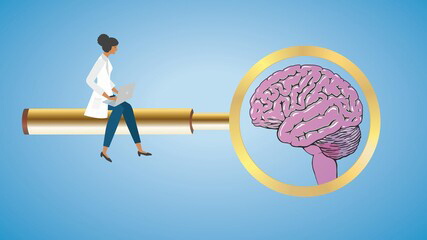How to Tell the Difference Between a Senior Moment and Dementia
The recent controversy over a new Alzheimer’s drug called Aduhelm raises again the question of what is age-appropriate forgetfulness and what is dementia.
Broadly, the concern over the drug is that its approval was accelerated despite evidence from clinical trials that failed to adequately prove its effectiveness. What’s more, marketers of the medication ran an advertising campaign that some experts feared caused undue concern among consumers.
According to Georgetown University Medical Center pharmacology professor Dr. Adriane Fugh-Berman, “It’s particularly egregious that they’re trying to convince people with normal age-related decline that they are ill and need a drug.”
The Aduhelm situation shines the spotlight on a common fear many of us have as we age: is it just a “senior moment” or is it something to worry about?
Subscribe to the Barclay Blog
Not an Exact Science
Determining what is and is not normal age-related memory loss is largely subjective. It depends on several factors, chief among them a person’s “baseline,” or what is characteristic of their usual self. A loved one, friend or doctor who knows them well is a good judge of whether they are experiencing something out of the ordinary.
That said, there are some differentiating signs and symptoms that can provide initial clues. (According to a popular rule of thumb, “Don’t worry if you can’t find your car keys; worry if you don’t know what to do with them.”)
Typical Age-Related Memory Lapses
More than half of people aged 65+ report being more forgetful than when they were younger. Here are some examples of occasional memory missteps that are common as blood flow to the brain naturally decreases with age and hormones and proteins that protect and repair brain cells decline:

- Forgetting someone’s name, a word or a book/show title here and there
- Making a bad decision once in a while
- Forgetting an appointment from time to time
- Missing a payment
- Forgetting what day it is and remembering it later
- Misplacing items occasionally
- Walking into a room and forgetting why you’re there, then remembering shortly after (usually after you’ve made it all the way to the other side of the house again!)
Signs of Dementia
First, let’s clarify the difference between dementia and Alzheimer’s. Dementia is a general term for a loss of cognitive function to the point of interference with daily life. Alzheimer’s is a specific disease and the most common type of dementia, accounting for 60-80% of dementia cases.
Here are some warning signs of memory loss that may indicate dementia or Alzheimer’s disease:
- Making bad decisions and exercising poor judgment much of the time
- Missing payments and having trouble managing bills often
- Confusion with time or place, losing track of the date or season
- Having trouble following recipes or directions
- Difficulty following a conversation, book or television show
- Losing things often and being unable to find them again
- Misplacing words often and making up substitutes for them
- Changes in mood or personality
- Withdrawal from social activities
- Getting lost on a walk or drive and not being able to find your way back
- Wandering
- Sundowner Syndrome
When to Talk to Someone
It is always wise to consult a trusted physician with concerns about your own or a loved one’s physical, mental or cognitive health. Read our blog for more about when to see a neurologist with concerns about dementia or Alzheimer’s.
For children of aging parents, having conversations about cognitive or physical decline can be particularly difficult. Read our blog for advice on how to have constructive discussions on this topic.
Simply expressing observations and fears about dementia is a huge first step, and a professional’s assessment is paramount going forward. Most likely, certain diagnostics will be run, including a physical exam, imaging, lab tests, and neuropsychological evaluations.
Medications may also be prescribed. While there is currently no cure for dementia or Alzheimer’s, some medicines may help lessen the symptoms of confusion and memory loss.
Keep in mind that there are other reasons for memory loss outside of dementia. Some medications can cause memory problems, as well as head injuries, mental health conditions such as depression and anxiety, hormonal fluctuations and other factors. A professional can help rule out such other explanations.
Beware of Unsubstantiated “Treatments”
The media and Internet (and even some well-meaning friends) abound with misinformation about what’s good for this or that, and cognitive decline is no exception. Heed only a trusted source (e.g., Alzheimer’s Association, the National Institute on Aging) or a professional’s advice on age-related memory loss, dementia and Alzheimer’s. Exercise great skepticism, and keep these precautions in mind:
- Beware of anything that promises a “cure” – there is currently no cure for dementia.
- Ignore claims of a “scientific breakthrough”. Legitimate research and advancements are being made all the time, but true scientific progress is gradual, meticulously tested and rarely, if ever, makes splashy headlines.
- Check with your doctor before purchasing any products, including dietary supplements, that promise to improve memory or cognitive function.
- Check the U.S. Food and Drug Administration for information about misleading claims, false products, advertising, etc.
Safeguarding Our Minds
While there is currently no definitive prevention against developing dementia and Alzheimer’s, there are certainly measures we can take to reduce the risk. Check out Barclay Friends’ blog to learn about the many physical, behavioral and social practices we can employ now to keep our bodies (gray matter included!) in promising shape for the future.
Dementia Care for Seniors
Barclay Friends’ continuum of care, including memory care, offers you or a loved one multiple choices and optimal peace of mind.